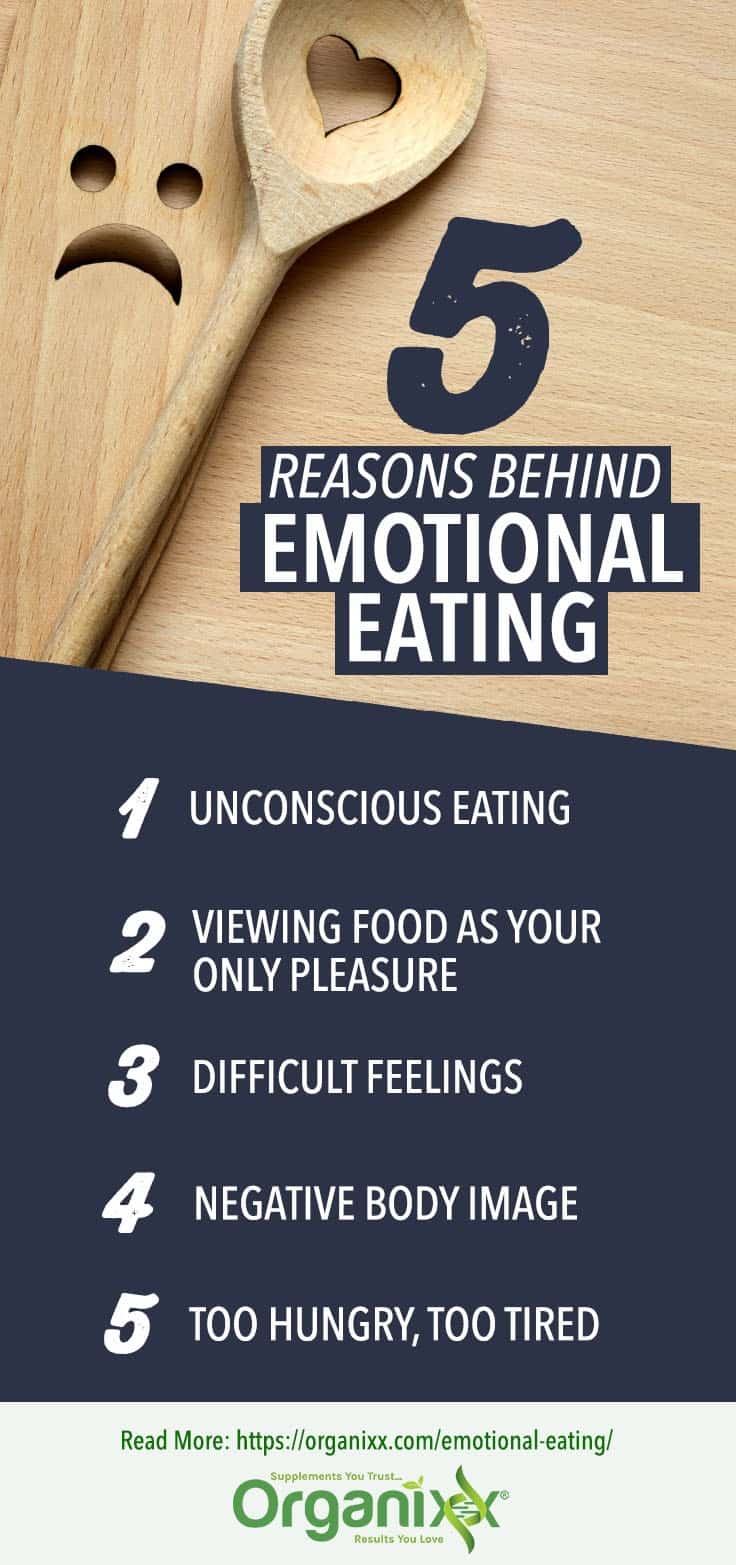It often begins with a negative thought or a stressful day at work…
You grab a couple of M&Ms, then it’s a handful of chips, and the next thing you know… you find yourself elbow deep in a take-out bag from McDonald’s.
Emotional eating is nothing new, but there is much more focus and awareness about it these days. Neuroscientists are even investigating why it’s causing trouble for so many of us in terms of weight gain, metabolic syndrome, type 2 diabetes, and other associated disorders.
If you were to ask a group of people who don’t emotionally eat about what causes it, they’d likely say it’s simply due to a lack of self-control. But it turns out that emotional eating is far more complex than that.
5 Factors That Contribute to Emotional Eating
According to psychologist Dr. Jennifer Kromberg, there are five factors that contribute to emotional eating [1]:
- Unconscious eating. Not being conscious of what you are eating or why.
- Viewing food as your only pleasure. The thought that without food, there would be nothing else in life to look forward to.
- Difficult feelings. Eating to distract yourself from thoughts or feelings that are unpleasant or make you feel bad, stressed, or depressed.
- Negative body image. Eating because you’re unhappy with the way you look and/or the shape of your body.
- Too hungry, too tired. Eating anything and everything because you have let yourself get too hungry, too tired, and simply don’t care in that moment what you’re putting into your body.
Do any of these reasons for emotional (over)eating resonate with you? As stated earlier, it’s a complex issue and other researchers have additional theories about what causes us to binge or overeat when we’re not even hungry.
Other Potential Causes of Emotional Eating
According to Dutch researcher Tatjana van Strien, there are many other causes of emotional eating. In her 2018 paper published in Current Diabetes Reports [2], she lists a condition known as alexithymia, an inability to recognize emotions and their subtleties. People who tend toward autism may also have this problem and not even know it.
Van Strien states other probable causes of emotional eating, including:
- an inability to manage difficult emotions,
- inadequate parenting, and
- a dysfunctional hypothalamic pituitary adrenal (HPA) axis (more on this below)
She believes that there is ample evidence of a link between emotional eating, obesity, and depression, and suggests that the treatment of obese people with emotional eating disorders should focus less on calorie-restricted diets and more on emotional regulation skills.

The Role of Stress in Comfort Eating
Stress in particular is implicated in emotional eating, and let’s face it: there are plenty of things in our lives that cause stress these days!

A 2013 study [3] stated that stress plays a key role in the development of an addiction and in addiction relapse. Foods that are highly palatable, sweet, and energy-dense may be as addictive as a schedule 1 narcotic.
Uncontrolled stress can also change eating patterns. While there are many people who will stop eating when stressed, there are others who have the opposite reaction and simply cannot stop eating – even when they’re physically full.
Cortisol is released when a person is under stress, and we now know that high cortisol levels are related to increases in obesity and metabolic disorders. When stressed, people often reach for foods with high fat and/or sugar content (often the aptly-named “comfort foods”). Eating sugar releases opioids and dopamine in the brain [4]. Opioids are also found in drugs like heroin, cocaine, and other narcotics.
It’s not your imagination that eating ice cream or other sweets has a calming, soothing effect on the brain. Bingeing on sugar, neurochemically speaking, causes changes in the brain similar to many drugs. It is very serious; breaking the sugar habit can be just as hard as kicking a drug habit!
What Happens in the Stressed-Out Brain?
Long periods of uncontrollable stress can cause dysfunction in the HPA axis, which includes the hypothalamus, pituitary gland, and adrenal glands. The HPA axis is intimately involved with stress responses. Chronic activation can alter metabolism of glucose, promote resistance to insulin, and influence appetite-related hormones [5].
Dysfunction in the HPA axis can result in compulsive behavior, weight gain, type 2 diabetes, cardiovascular disease, and a host of other problems.
It’s easy to see then why learning to control stress and getting to the root of an emotional eating habit is vital for your health.
Helpful Tips to Overcome Emotional Eating
Based on the reasons for emotional eating put forward by Dr. Kromberg (listed above), here are some tips you may find helpful if emotional overeating is an issue for you.
#1 – For unconscious eating, it is helpful to develop more awareness each time you enter the kitchen (or fast food outlet, restaurant, lunchroom at work, or wherever you tend to eat). This is called mindful eating. Try not to eat while you’re distracted (turn off your phone, TV, etc.) and take a moment before you start eating to take a few calming breaths and become aware of the food you are about to consume.
Really focus on the food in front of you and savor every bite. Thoroughly chew your food before swallowing. While eating, be grateful for your food and its ability to nourish your body and keep you alive and well. When you feel full, stop eating, put everything away, and move away from the “eating” area so your brain knows you’re finished.
#2 – Be aware of times when you feel food is your only pleasure, and find other pleasurable ways to reward/distract/soothe yourself. Initially, this will be challenging, and the temptation to eat will be strong. It is all about retraining the brain, which takes time and repetition.
Find a time when you’re not in the mood to emotionally eat to create a list of alternate activities. This might include stretching, taking a walk, playing with your kids or a pet, deep breathing, or smelling some pleasing essential oils.
If you find yourself struggling, seek some help. There are a number of programs and services online that can help to address emotional eating issues and/or find a trusted coach, counselor, or psychologist in your area.
#3 – For those who eat in response to difficult feelings, this can be another area to work towards healing. Rather than stuffing down bad feelings by eating, take a moment to recognize and examine the emotion that’s coming up for you that’s making you want to eat.
Is it stress, sadness, or boredom? When we acknowledge negative feelings they’ll often dissipate quickly on their own. If it’s a deep-rooted issue that’s never been dealt with, then psychotherapy or counselling can help here too.
A 2018 study [6] found that dwelling on negative experiences and emotions (ruminating) has been implicated in mood and anxiety disorders and is related to eating disorders. Sharing your feelings with someone trained to help you work through these feelings can be a transformative experience.

#4 – If a negative body image is at the heart of your emotional eating, it is imperative to attend to this in order to stop the cycle. Hating your body is a huge factor in emotional eating and can have some serious consequences.
Self-hate, unattended, can lead to depression, self-harm, or even suicide. Again, working with a trained therapist can make an immense difference in this type of emotional eating. Please seek help.
#5 – For those who binge after waiting too long to eat, the problem is more easily solved. When you’re really hungry, your body sends strong signals to the brain that it must eat NOW.
If you are too tired to prepare a healthy meal, this can leave you vulnerable to eating the wrong things (and too much of them). Make sure you’re getting enough sleep at night so you can make it through your day. Planning ahead and having healthy food easily available is also vital.
It’s important too to listen to your body’s cues throughout the day and make the time to eat when your body is truly hungry. Your body and brain require quality fuel for you to feel well, do the work you want to do, and shine as only you can shine. Sleep and nutritious food need to be your priority.
#6 – It has been said that you cannot change what happens to you, but you can change your reaction. If chronic stress is at the heart of your emotional eating issues, meditation and mindfulness training can be immensely helpful, so make time for it.
Go to a meditation class or, if you are just beginning, download a guided meditation from the Internet. If the stress is coming from another person, seek counseling with that person and a trained therapist. But get that stress under control – your health and even your life may depend upon it.
If you have additional tips that help with emotional eating, please add them in the Comments section below.
Magnesium deficiency is linked to stress, diabetes, heart disease, osteoporosis, chronic fatigue syndrome, depression, anxiety, trouble sleeping, sore muscles, migraines, and many more debilitating health conditions.
If your body needs magnesium, you want the most beneficial kind your body can actually absorb. Organixx Magnesium 7 gives you seven (7) of the very best, most bioavailable types of elemental magnesium available.




